Editor's note: Ghanbar Naderi is an Iranian columnist and political commentator. The article reflects the author's opinion, and not necessarily the views of CGTN.
Having failed to persuade US President Donald Trump to stay in the Iran nuclear deal, it makes sense for French President Emmanuel Macron to visit Russia and to reach out to President Vladimir Putin – despite deep differences over Syria, Ukraine and alleged Russian meddling in the West.
Make no mistake, Macron is not planning to cozy up to Putin, nor is he seeking to pivot away from France’s longstanding alliance with the US in favor of one with Russia. Rather, he wants to keep a dialogue open to help solve world crises.
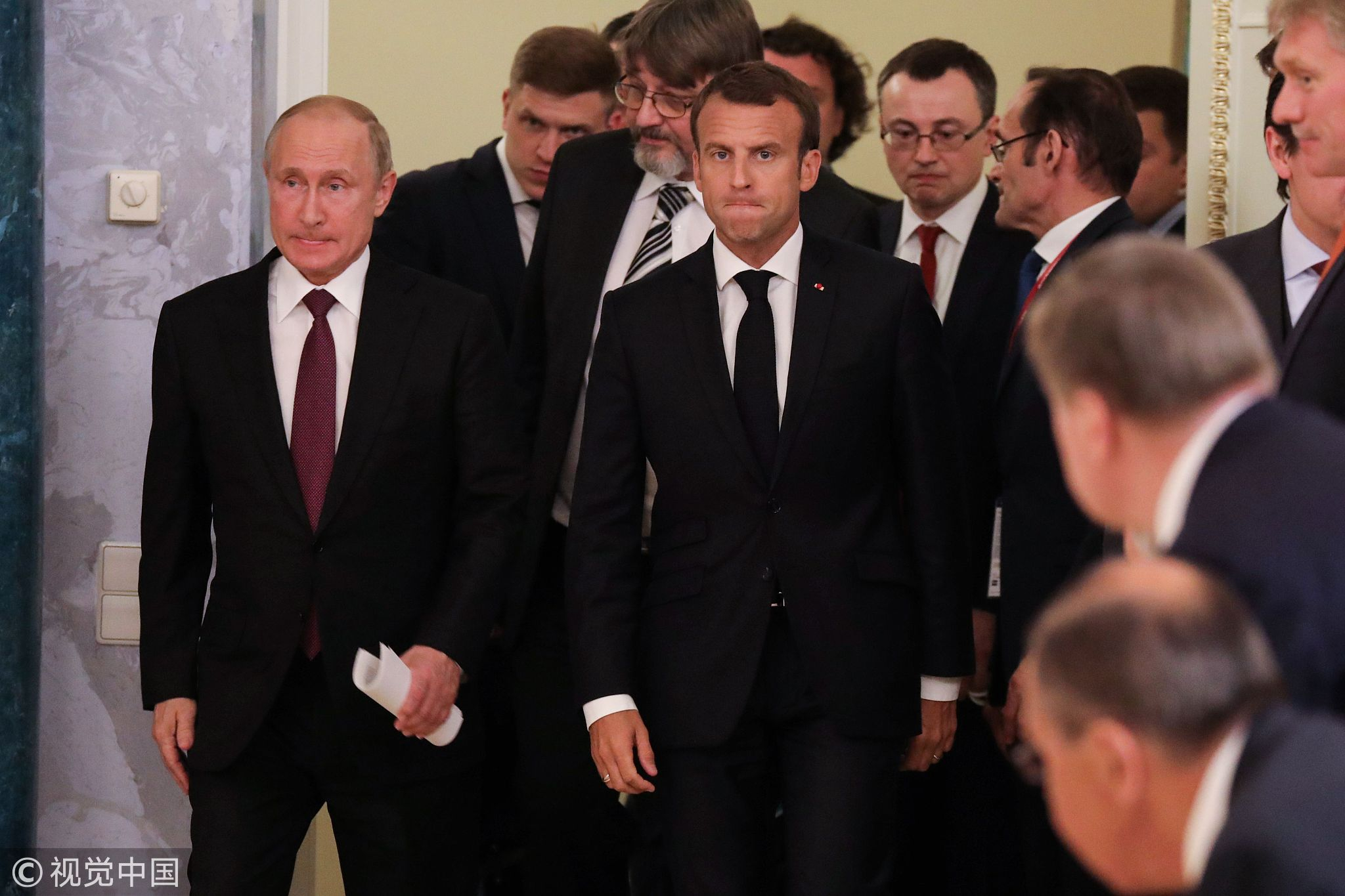
Russian President Vladimir Putin (L) and his French counterpart Emmanuel Macron arrive to attend a joint press conference following their talks at the Konstantin Palace in Strelna, outside Saint Petersburg, on May 24, 2018. /VCG Photo.
Russian President Vladimir Putin (L) and his French counterpart Emmanuel Macron arrive to attend a joint press conference following their talks at the Konstantin Palace in Strelna, outside Saint Petersburg, on May 24, 2018. /VCG Photo.
For instance, France wants Russia to use its influence with Iran to ensure it respects its nuclear commitments despite Trump’s extraordinary brutal decision. The Iran issue marks the first time that Russia and France have agreed on such a major matter in years. On balance, Macron and Putin don’t really suit each other. They live next door and just visit now and then.
Coinciding points of view
Macron and Putin want to salvage the Iran nuclear deal and it’s precisely here that their points of views coincide. Both men know full well that they have to edge a bit closer to each other because they can’t save the nuclear accord on their own.
They need all the help they can get from other signatories to the deal – China, UK, Germany – if they want to find ways to keep it alive and prevent a nuclear arms race in the Middle East despite the threat of new US sanctions on those doing business with Iran.
To that end, France’s finance minister says Europe has to build independent financial institutions immunized from US penalties which are making business in Iran impossible for European companies.
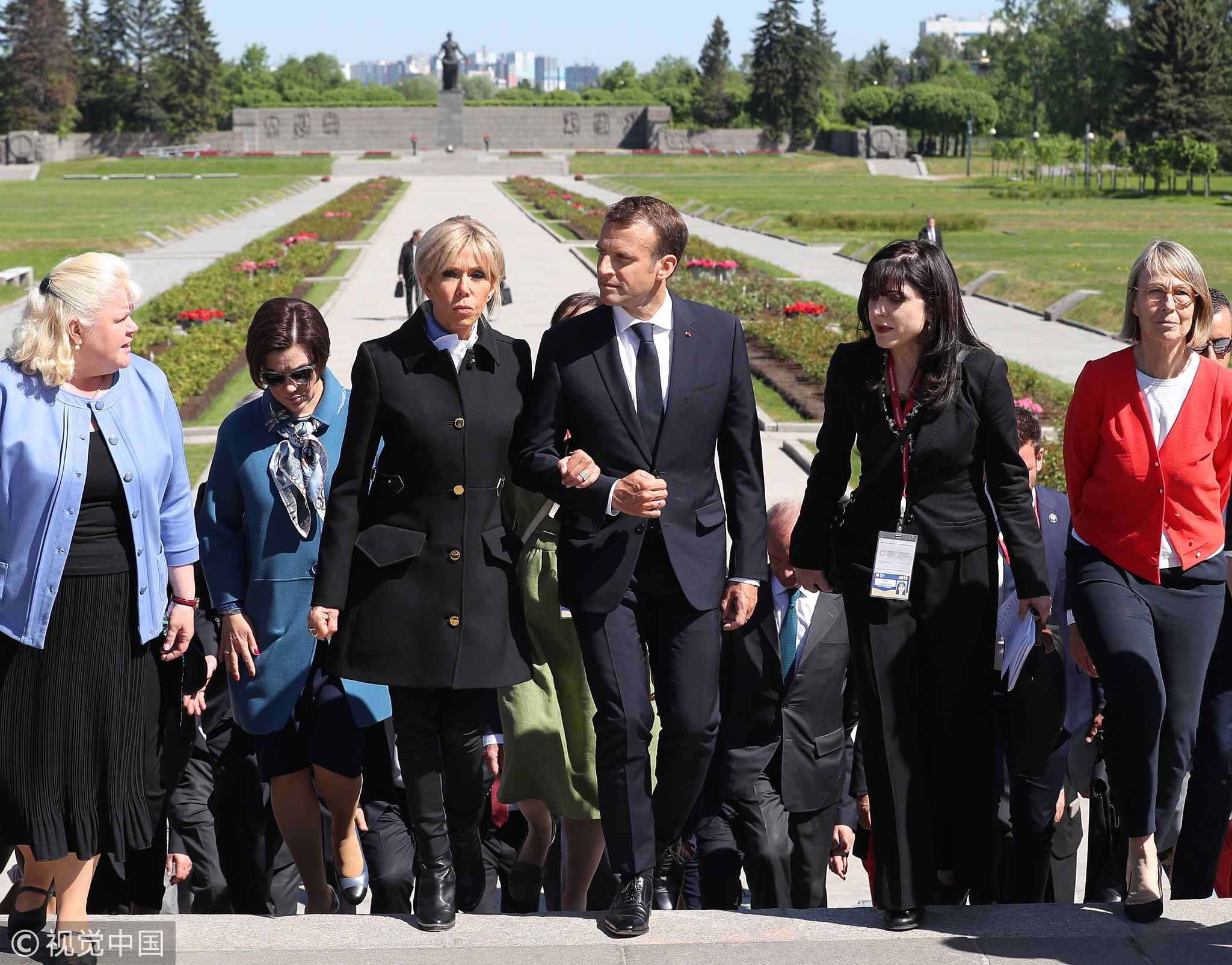
France's President Emmanuel Macron with wife Brigitte (R-L centre) attend a ceremony to lay flowers at the Motherland monument at St Petersburg's Piskaryovskoye Memorial Cemetery, a mass grave site for the fallen WWII Leningrad Front soldiers and victims of the Siege of Leningrad. /VCG Photo.
France's President Emmanuel Macron with wife Brigitte (R-L centre) attend a ceremony to lay flowers at the Motherland monument at St Petersburg's Piskaryovskoye Memorial Cemetery, a mass grave site for the fallen WWII Leningrad Front soldiers and victims of the Siege of Leningrad. /VCG Photo.
The problem is, most French companies interested in maintaining businesses in Iran won't be able to stay because they need to be paid for the products they deliver to or build in Iran. They cannot be paid because there is no sovereign and autonomous European financial institution.
So unlike Russia which is not that much vulnerable to the "extraterritorial" US measures and can help Europe with Iran trade in numerous ways, Trump’s exit from the nuclear deal means some major European firms such as French oil group Total and carmaker PSA will have no choice but to wind down activities in Iran.
They face a short deadline to dismantle their operations before new US sanctions kick in – even though Paris has rebuked the US move as an open assault on multilateralism, saying “the US should not be the planet's economic policeman."
Can Europe divorce the US?
On June 9, the leaders of the G7 failed to heal a tariff dispute in a summit in Canada that pushed them to the brink of trade war, as Trump quit the summit early warning Canada, Japan and Europe that "the gig is up."
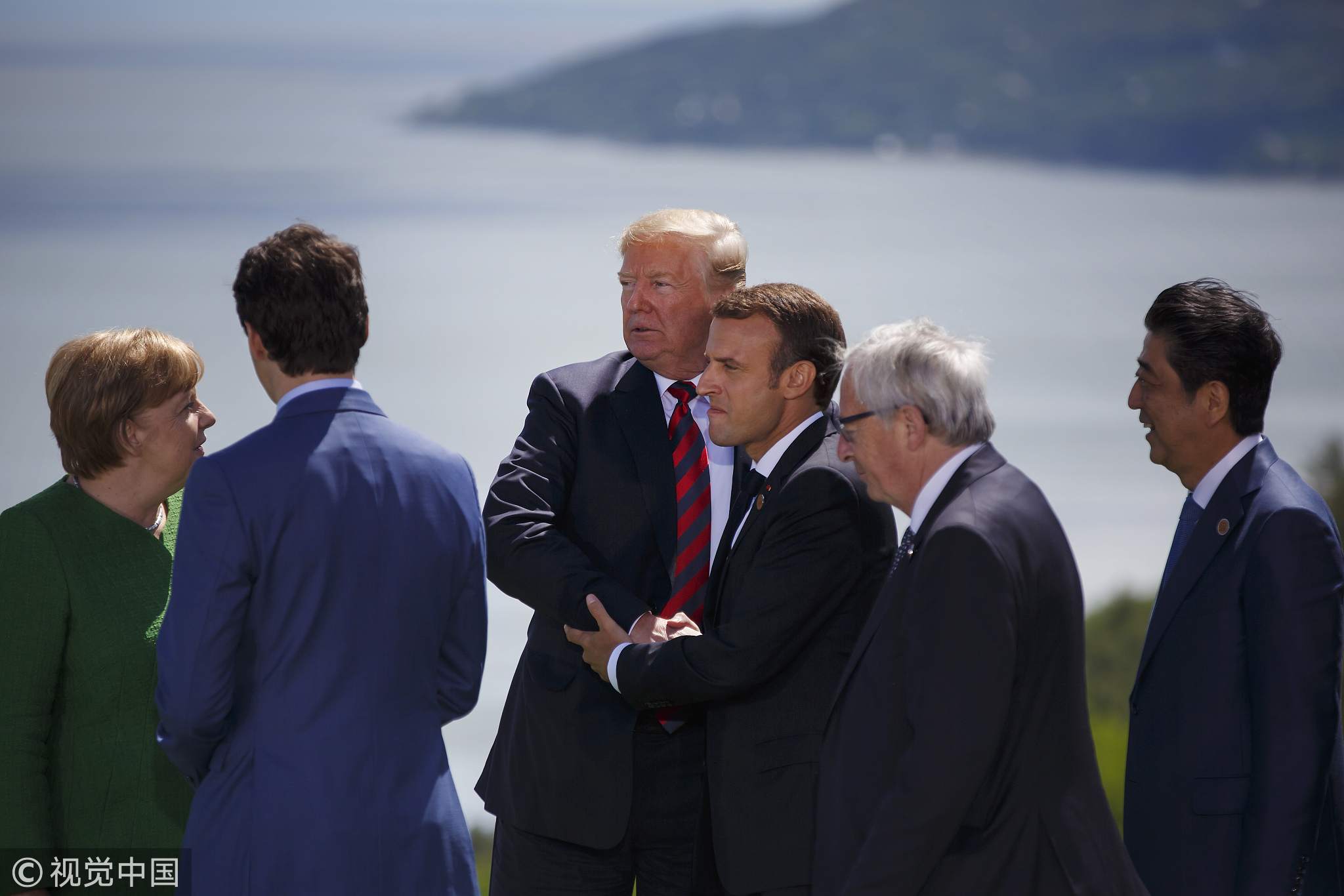
US President Donald Trump shakes hands with Emmanuel Macron, France's president, after standing for a family photograph during the Group of Seven (G7) Leaders Summit in La Malbaie, Quebec, Canada, on Friday, June 8, 2018. /VCG Photo.
US President Donald Trump shakes hands with Emmanuel Macron, France's president, after standing for a family photograph during the Group of Seven (G7) Leaders Summit in La Malbaie, Quebec, Canada, on Friday, June 8, 2018. /VCG Photo.
Trump might be right playing a wild card, but that’s all it is really. Europe can’t afford to divorce the US.
Despite being the largest trade bloc in the world, it does not have the capacity to tackle 21st-century challenges on its own, and it would have even less capacity to do so if its relationship with the US came fully apart.
There is simply no alternative to a strong transatlantic partnership. There is no available spare superpower with which Europeans would share enough interests to build a new form of alliance. Russia offers no such alternative.
One and the same fight
A common ground among big leaders like Macron and Putin who are trying to take care of their countries’ geopolitical interests in the Middle East is that they are not getting enough sleep over the ongoing war on terror. For them, it’s one and the same fight.
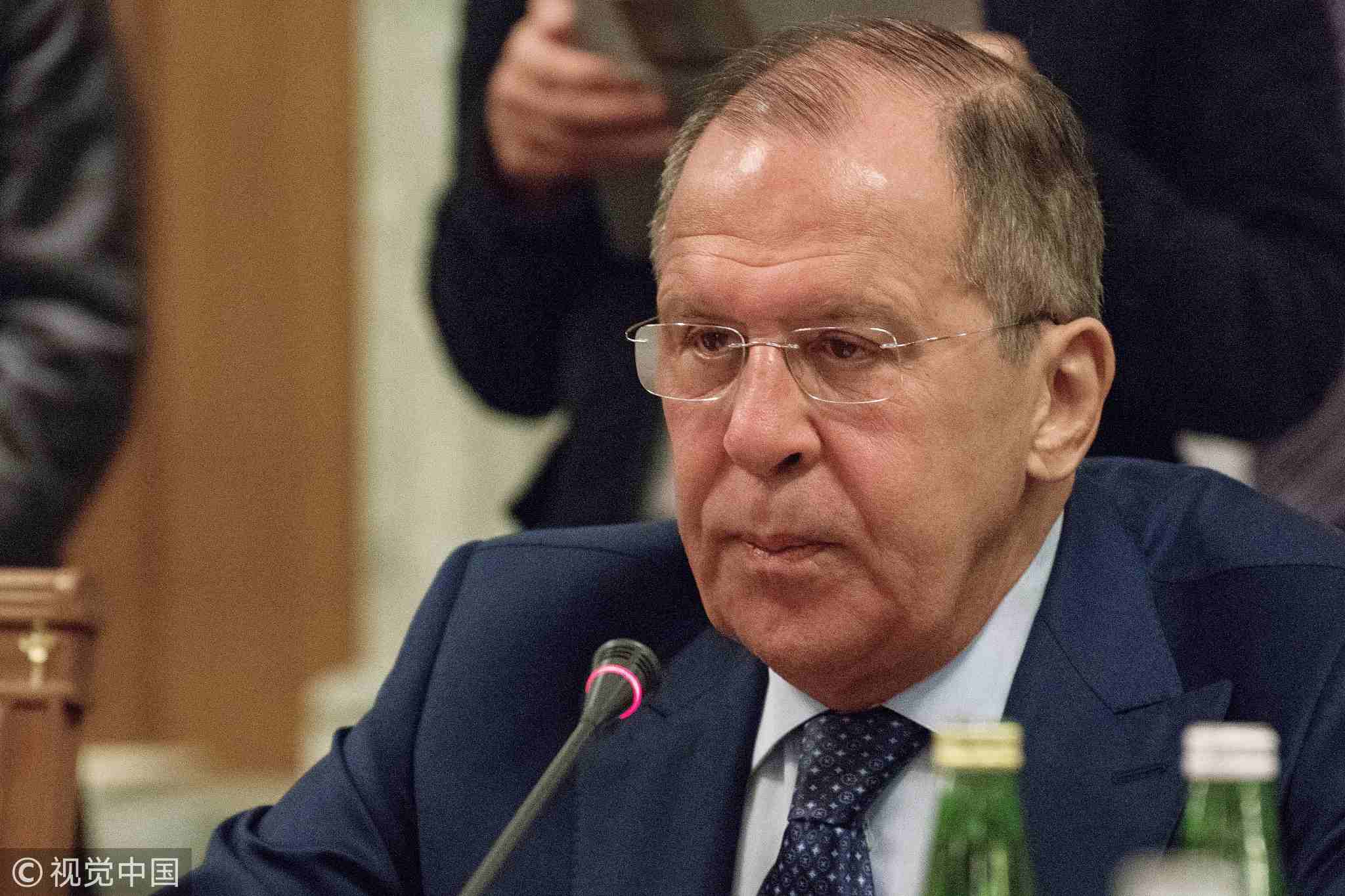
Russian Foreign Minister Sergei Lavrov during a meeting with his counterpart from Hashemite Kingdom of Jordan Ayman Safadi, Sochi on May 3, 2018. /VCG Photo.
Russian Foreign Minister Sergei Lavrov during a meeting with his counterpart from Hashemite Kingdom of Jordan Ayman Safadi, Sochi on May 3, 2018. /VCG Photo.
Indeed, Europe has every reason to maintain a partnership with Russia for the magnitude of the security risks it faces. ISIL might be militarily defeated in Iraq and Syria, but jihadist terrorism is a generational challenge.
Europe cannot afford to turn its back on cooperation with Russia just as it cannot afford to turn its back on cooperation with the US. The trauma of terrorist attacks in Europe remains vivid.
The security of the Middle East is something that Europeans have an existential interest in protecting and upholding. France’s decision not to cooperate with Russia on regional security – a country which helped Syria and Iran to defeat the terrorist group of ISIL – can only be an own goal. France’s credibility in fighting terrorism will be severely affected too.
The truth is, Europe can no longer rely on Trump, which cares little about NATO, and believes the US isn’t getting a fair return on its investment in European security. He has withdrawn from the Paris climate agreement and has imposed tariffs on steel and aluminium.
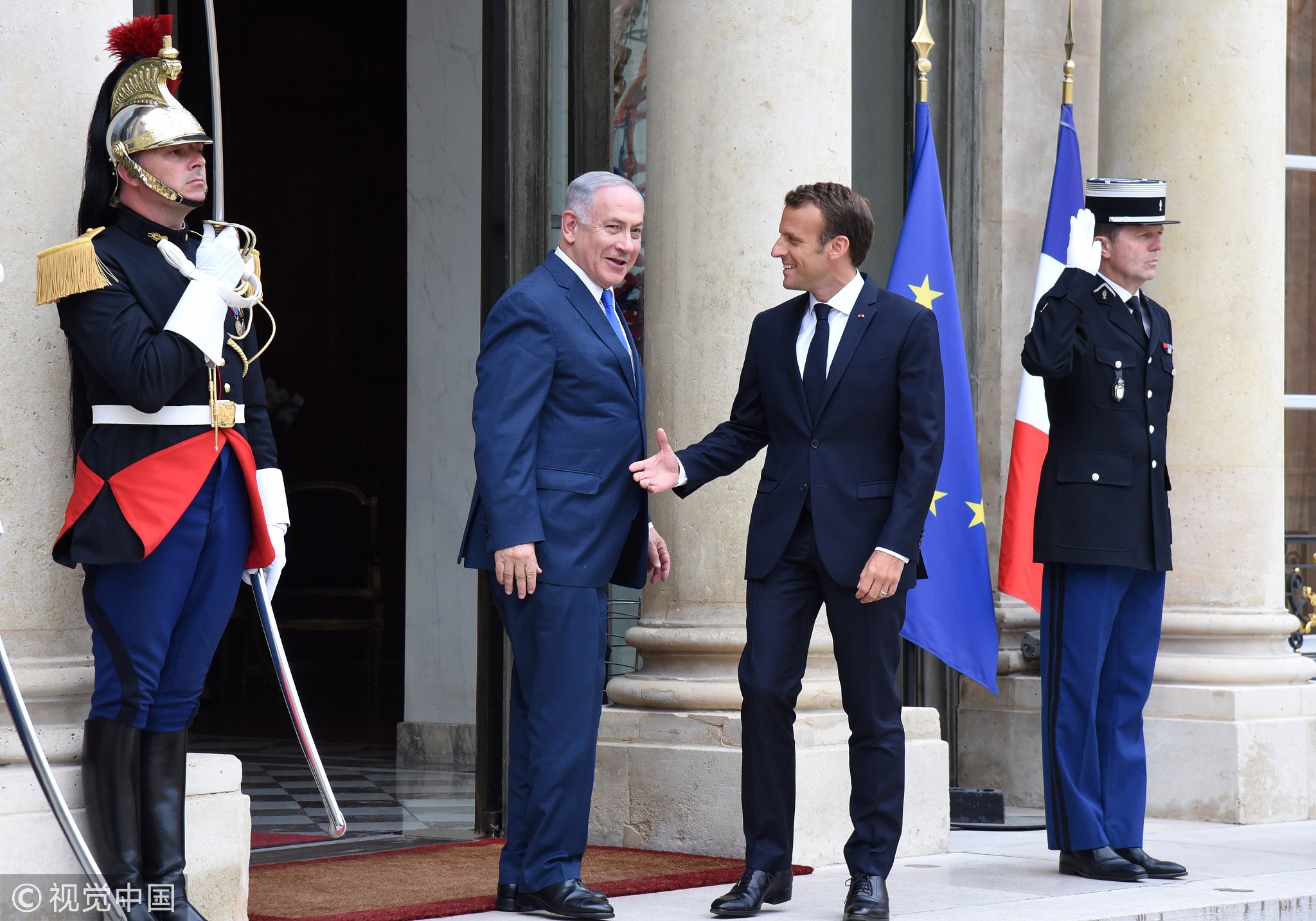
French President Emmanuel Macron welcomes Israeli Prime Minister Benjamin Netanyahu at the Elysee Palace in Paris, France on June 5, 2018. /VCG Photo.
French President Emmanuel Macron welcomes Israeli Prime Minister Benjamin Netanyahu at the Elysee Palace in Paris, France on June 5, 2018. /VCG Photo.
This kind of mentality could end badly in Syria. When Macron realizes Trump’s anti-Russia strategy is bound to fail, that there will be no regime change in Damascus, and that they cannot resort to military force, he has no choice but to go to Moscow. Any other decisions or disparaging comments run counter to French and European interests.
Conversely, Europe needs to be firm with Washington on Iran. The nuclear deal, or what remains of it, needs to be supported. If it collapses entirely, that should not be because of Europe.
Trump has taken an extraordinary gamble, and France, Germany and Britain would be the first, outside the Middle East, to suffer the consequences if yet more chaos and war erupts.
Europe’s least bad option is to show they are ready to do what they can to preserve the 2015 deal. They need to mitigate the impact of US sanctions on European business – and Iran as an incentive to stay in the deal – and they need all the help they can get from Russia and China – Iran’s largest trading partners.







